All About Fiber
This post is sponsored by Metamucil® Free
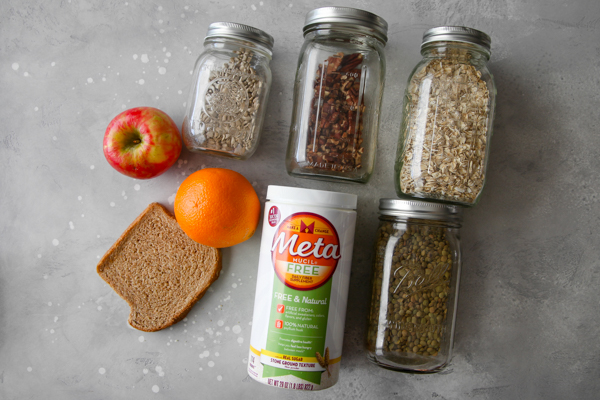
I’m putting on my dietitian hat today to talk all about fiber! Everybody knows fiber is good for you and part of a healthy diet. But do you know why?
When most people think of fiber, you probably think about raw vegetables, beans, and bran cereal. But that’s just the tip of the iceberg lettuce. So what exactly is fiber?
The two types of fiber
Fiber refers to a group of carbohydrates that humans can not digest due to lacking the enzymes that break them down. While we extract nutrients and break down most of what we eat, fiber is the stuff that comes out the other end. It serves a purpose though, and there are two main types with different roles.
 MY OTHER RECIPES
MY OTHER RECIPES
Soluble fiber
Soluble fiber blends with water in the gut. Some soluble fibers dissolve entirely others form a gel like substance. Gel forming fibers can have metabolic benefits like helping maintain healthy blood sugar levels. These fibers also slow down digestion helping you stay full longer.
Soluble fibers include gums, pectins, psyllium, beta-glucans and more and is found in oats, barley, nuts, seeds, beans, lentils, peas, apples and citrus fruits. Psyllium, the main ingredient in Metamucil, is one of these gel forming fibers. (source)
Insoluble fiber
Insoluble fiber does not blend with the water and passes through the digestive system mostly intact. It functions mostly as a “bulking” agent, and may help speed the passage of food and waste through your gut.
Insoluble fibers include lignin and cellulose and is found in foods such as wheat bran, vegetables, and whole grains.
I know vegetables have their wonderful benefits, but I like the sound of a soft, soluble fiber moving through me more than the “roughage” of insoluble! However, most plants, such as oats and beans, contain both soluble and insoluble fiber.
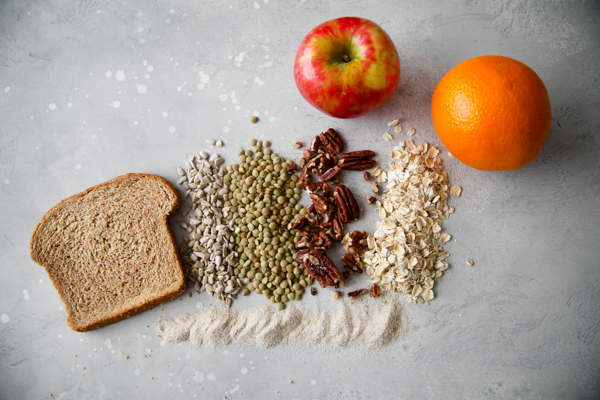
Soluble fibers linked to better appetite control
In addition to the above, soluble fiber in particular is linked to a few specific health benefits. This study found that soluble fibers, which are thick and viscous, reduced appetite more than the insoluble fibers (59% v 14%).
Moreover, incorporating more viscous fiber into a meal slows both gastric emptying and the rate at which food moves through the small intestines, thereby slowing both carbohydrate and fat absorption and increasing overall satiety and reducing appetite. (source)
Good whole-food sources of soluble fiber include legumes, asparagus, Brussels sprouts, flax seeds, and oats. Psyllium husk, which is the main ingredient in Metamucil, is also very high in soluble fiber.
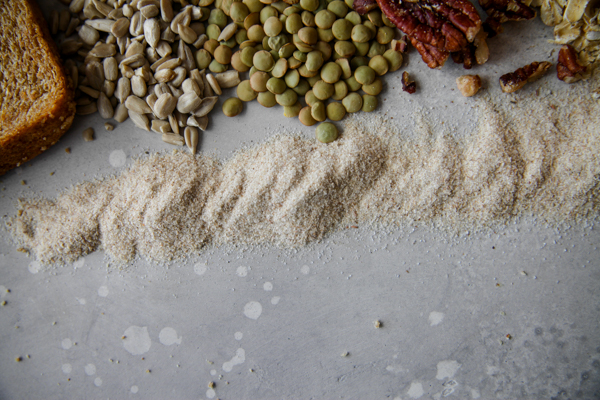
Consuming Adequate Fiber
The recommended fiber intake is 38 grams for men and 25 grams for women. Women need less because we have lower caloric needs, but obviously this target number is personalized to individual diet and lifestyle. To figure out your recommended daily intake, you can add 14 grams of fiber for every 1000 calories you consume per day, or take your daily calories multiplied times 0.014. (source)
Most people aren’t getting enough
You might think: “I eat a salad a day, so I am surely getting enough fiber.” Yet according to the 10 year NHANES study, average fiber intake for men and women was only 15-17 grams, much less than recommended.
It would be great if we could all eat such a wide variety of whole foods that we’d reach 25-38 grams of fiber with no trouble. Everyone’s appetite would be tame, and poops would be soft and regular (woo hoo!!). But unfortunately many people fall short, as the NHANES study reported. If you feel your fiber intake could use a little boost or your bowels could use a bit of regularity, even as needed like during pregnancy, adding Metamucil to your daily routine could be a simple answer.
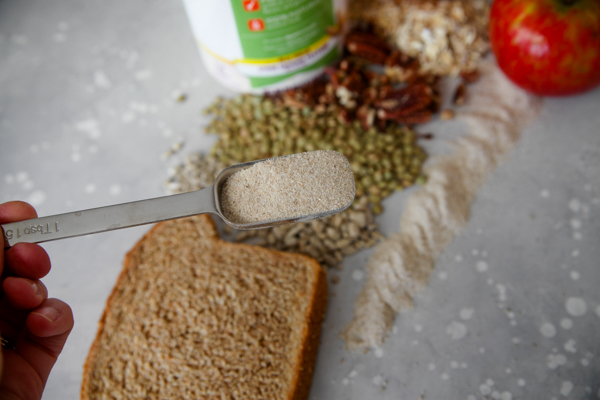
Metamucil is made from all natural psyllium husk, a dietary fiber originating from plantago ovata. Psyllium is a mostly soluble viscous fiber, which forms that viscous gel when mixed with water in your GI tract. This gel traps bile acids (made from cholesterol) and prevents some from being reabsorbed, thereby reducing blood cholesterol levels. The gel also traps some carbohydrates and sugars, allowing them to be more slowly absorbed by the body once it reaches the small intestines supporting healthy blood sugar levels and controlling appetite. All Metamucil powders are made with 100% all natural psyllium fiber with a stone ground texture. My personal favorite is Metamucil Free with real sugar for flavor when consuming with water. My favorite way I incorporated Metamucil Free into my diet was mixed into smoothies, which I make at least 3 times a week, if not more. It was also undetectable in oatmeal because it’s kind of like oatmeal already!
If you tally up a day’s worth of food and aren’t coming close to 25 grams, focus on adding more fiberific foods. Add more whole grains, swap beans for meat, and choose fresh fruit for a snack. Many of the lower grain or lower carb diets are also lower in soluble fiber, so that’s something to take into consideration if you don’t consume foods like wheat or oats. If you’re not meeting your goal, Metamucil can help you close the gap.
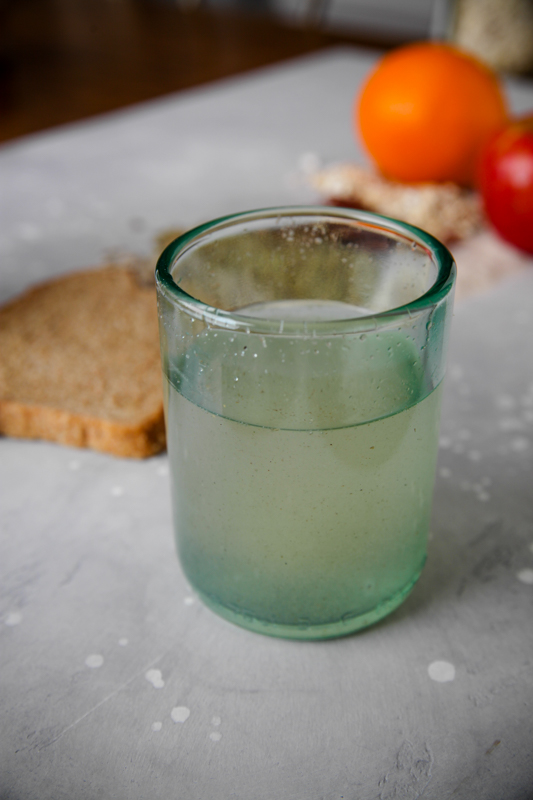
Health Benefits of Adding Metamucil To Your Day
- Helps you feel less hungry between meals* thanks to soluble fiber forming a gel which aids in the sensation of fullness.
- Helps maintain healthy blood sugar levels as part of your diet*. Metamucil forms a viscous gel that traps sugars, which are slowly released and absorbed into the body.
- Helps lower cholesterol to promote heart health†. Metamucil provides an easy way to help reduce your risk of heart disease by adding psyllium fiber to your heart-healthy diet.
- Helps promote digestive health*. The psyllium fiber in Metamucil helps maintain regularity and can be used to treat occasional constipation.
Ways to get more fiber!
-Always choose whole grains in cereal, bread, and pasta.
-Snack on fresh fruits and veggies over packaged snacks.
-Eat more oats! Have oatmeal, overnight oats, oatmeal muffins, or an oatmeal smoothie for breakfast.
-Beans, beans, they’re good for your heart because they’re a good source of fiber
-Add a spoonful of Metamucil to your smoothies or oatmeal or enjoy in between meals with a tall glass of water.
-Always drink plenty of water!
Thanks to Metamucil Free for sponsoring this post
†Diets low in saturated fat and cholesterol that include 7 grams of soluble fiber per day from psyllium husk, as in Metamucil, may reduce the risk of heart disease by lowering cholesterol. One serving of Metamucil Powder has at least 2.4 grams of this soluble fiber. Consult a doctor if you are considering use of this product as part of a cholesterol-lowering program.
*These statements have not been evaluated by the Food and Drug Administration.
This product is not intended to diagnose, treat, cure, or prevent any disease.
from Kath Eats Real Food https://ift.tt/2qLnmN9
Comments
Post a Comment